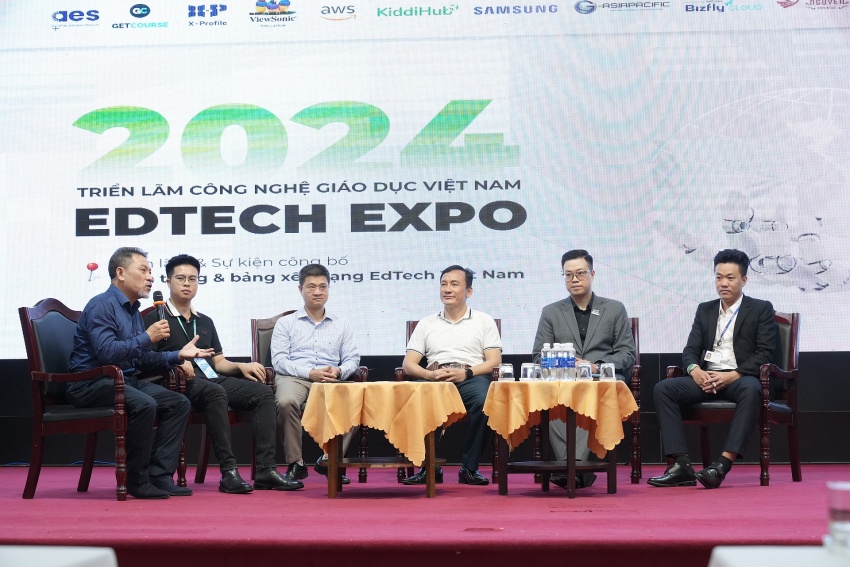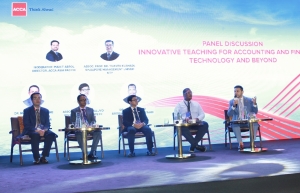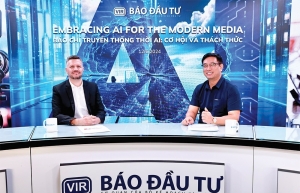AI-integrated products leading the trend in education
According to the White Paper, published at the Edtech Expo on August 10, the Vietnamese education technology (edtech) market is expected to witness further adoption of AI and emerging technologies. The top technological factors to be utilised in edtech products in Vietnam include ChatGPT, XR/AR/VR, and STEM/STEAM.
The Edtech Agency presented data at the expo indicating that the revenue in the Vietnamese online education market this year is projected to reach almost $365 million, with the online learning platform market estimated to be worth a little under $230 million, with many international edtech products entering the segment in 2024, such as Testglider and IELTS Science.
Speaking at the expo during a seminar on AI and machine learning in education, To Hong Nam, deputy director of the IT Department, Ministry of Education and Training (MoET) said, "The stance from the government and MoET is to promote the use of AI in teaching and learning, assessment and evaluation, and school management. There are negative aspects, such as concerns about information security, the risk of user dependence on technology, and issues related to plagiarism. Therefore, in the near future, regulatory bodies and schools need to establish guidelines and rules for effective AI implementation."
 |
"When ChatGPT was introduced, some countries banned it. This is an extreme approach; we should instead leverage the benefits of technology while minimising potential drawbacks, rather than imposing a ban," added Nam.
The White Paper also suggests investors in the Vietnamese edtech market should focus on edtech companies whose products align with market trends and demands, ensuring high competitiveness against existing free products. Investment should prioritise companies with sustainable business models that emphasise content quality.
For edtech companies, technology and AI are essential elements for attracting users and investors. They must ensure that educational content complies with MoET’s requirements and Vietnamese legal regulations.
Investments should also be directed towards design, user experience, and communication activities, as Gen Z is the largest user group of current edtech products.
Additionally, collaboration with universities in building and refining training programmes is necessary to support the development of edtech talent.
"Teachers need AI to interpret and read content to aid in teaching. AI also has the capability to develop new functionalities. Making appealing content to engage young learners is a significant challenge for educators today," said Nguyen Quoc Thanh, EdTech Solutions manager at ViewSonic Corporation.
Experts also discussed how career-oriented AI tools can analyse students’ strengths, preferences, and market trends to support informed career decisions, adding a personalised element to career planning and helping individuals find opportunities that match their skills and aspirations in a dynamic job market.
 | AI explosion raises questions for press and media production AI can facilitate the smoother management of press and media operations, driving both results and performance, but the slow application of such tech also poses the risk of increased costs from old processes. This is creating a new challenge for Vietnamese press agencies and traditional media in the AI era. |
 | AI changing teaching and learning During a panel discussion themed "Innovative Teaching for Accounting and Finance: Technology and Beyond" held by the Association of Chartered Certified Accountants (ACCA) on May 29, experts from various universities in the region discussed and recommended ways of using AI in teaching and studying. |
 | New AI offerings pose more questions The AI explosion is continuing at pace with new offerings from the biggest tech groups in the world, but ethical concerns and investing considerations are taking up more focus as industries like the media and manufacturing adjust their priorities. |
What the stars mean:
★ Poor ★ ★ Promising ★★★ Good ★★★★ Very good ★★★★★ Exceptional
 Tag:
Tag:
Related Contents
Latest News
More News
- Agro-forestry and fisheries exports jump nearly 30 per cent in January (February 09, 2026 | 17:45)
- Canada trade minister to visit Vietnam and Singapore (February 09, 2026 | 17:37)
- New tax incentives to benefit startups and SMEs (February 09, 2026 | 17:27)
- Vietnam forest protection initiative launched (February 07, 2026 | 09:00)
- China buys $1.5bn of Vietnam farm produce in early 2026 (February 06, 2026 | 20:00)
- Vietnam-South Africa strategic partnership boosts business links (February 06, 2026 | 13:28)
- Mondelez Kinh Do renews the spirit of togetherness (February 06, 2026 | 09:35)
- Seafood exports rise in January (February 05, 2026 | 17:31)
- Accelerating digitalisation of air traffic services in Vietnam (February 05, 2026 | 17:30)
- Ekko raises $4.2 million to improve employee retention and financial wellbeing (February 05, 2026 | 17:28)




















 Mobile Version
Mobile Version